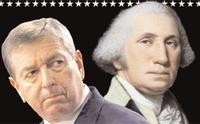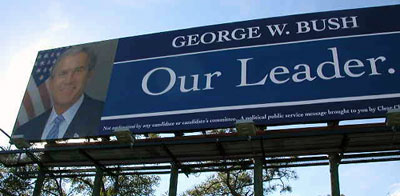 Nice article in Ms. Magazine (eh, no, I don't normally read that), Fighting Words For A Secular America, about the framers of the U.S. Constitution and to which degree their endeavor had religious roots. I.e. is the U.S. a christian country founded by devout christians who founded the laws on the authority of God? The U.S. religious right, like the current regime in power, would like to claim so, and many people would be inclined to believe it. Just happens not to be true. Nice article in Ms. Magazine (eh, no, I don't normally read that), Fighting Words For A Secular America, about the framers of the U.S. Constitution and to which degree their endeavor had religious roots. I.e. is the U.S. a christian country founded by devout christians who founded the laws on the authority of God? The U.S. religious right, like the current regime in power, would like to claim so, and many people would be inclined to believe it. Just happens not to be true.[T]he 1796 Treaty of Tripoli — initiated by George Washington and signed into law by John Adams — proclaims: “The Government of the United States of America is not, in any sense, founded on the Christian Religion.”
Offices for "Faith-Based Initiatives" with nearly $20 billion in grants have been established (by executive order, circumventing Congress) in 10 federal agencies, as well as inside the White House. This fails "the Lemon Test", violating a 1971 Supreme Court decision (Lemon v. Kurtzman): "first, a statute [or public policy] must have a secular legislative purpose; second, its principal or primary effect must be one that neither advances nor inhibits religion; finally, the statute [or policy] must not foster ‘excessive government entanglement with religion.'"
When Attorney General John Ashcroft repeatedly invokes religion, the Founders must be picketing in their graves. They were a mix of freethinkers, atheists, Christians, agnostics, Freemasons and Deists (professing belief in powers scientifically evinced in the natural universe). They surely were imperfect. Some were slaveholders.
Female citizens were invisible to them — though Abigail Adams warned her husband John, "If particular care and attention is not paid to the Ladies, we are determined to foment a Rebellion, and will not hold ourselves bound by any Laws in which we have no voice, or Representation."
But the Founders were, after all, revolutionaries. Their passion — especially regarding secularism — glows in the documents they forged and in their personal words.
Indeed, the constitutional framers had quite some poignant words to say about the separation of church and state. Which would get them accused of being the worst sort of liberal communist devil worshippers, if they were saying them today, I'm sure. Thomas Paine: "I do not believe in the creed professed by the Jewish church, by the Roman church, by the Greek church, by the Turkish church, by the Protestant church, nor by any church that I know of. My own mind is my own church" (The Age of Reason, 1794).
Benjamin Franklin: "Some volumes against Deism fell into my hands ... they produced an effect precisely the reverse to what was intended by the writers; for the arguments of the Deists, which were cited in order to be refuted, appeared to me much more forcibly than the refutation itself; in a word, I soon became a thorough Deist"
I actually myself had missed the distinction of deism vs theism. Deism is when one believes in a first cause based on reason rather than faith. It is contrasted to theism. Deism is mostly synonymous with "natural religion" in 18th century Enlightenment writings. A modernist movement inspired by the success of the scientific method. The founders were mostly inspired by deism, although some of them were theists and some were atheists.The false image of Washington as a devout Christian was fabricated by Mason Locke Weems, a clergyman who also invented the cherry-tree fable and in 1800 published his Life of George Washington. Washington, a Deist and a Freemason, never once mentioned the name of Jesus Christ in any of his thousands of letters, and pointedly referred to divinity as "It."
Whenever he (rarely) attended church, Washington always deliberately left before communion, demonstrating disbelief in Christianity's central ceremony.
And then there's Thomas Jefferson:It's a commonly stated error that U.S. law, based on English common law, is thus grounded in Judeo-Christian tradition.
Yet Jefferson (writing to Dr. Thomas Cooper, February 10, 1814 ) noted that common law "is that system of law which was introduced by the Saxons on their settlement in England ...about the middle of the fifth century. But Christianity was not introduced till the seventh century. ...We may safely affirm (though contradicted by all the judges and writers on earth) that Christianity neither is, nor ever was a part of the common law."
Jefferson professed disbelief in the Trinity and the divinity of Jesus Christ, while respecting moral teachings by whomever might have been a historical Jesus. He cut up a Bible, assembling his own version: "The whole history of these books [the Gospels] is so defective and doubtful," he wrote Adams (January 24, 1814), "evidence that parts have proceeded from an extraordinary man; and that other parts are of the fabric of very inferior minds."
Anyway, there's lots more. Those were definitely thinking people. It is a shame that their work is being undone. But then again, it can't completely be undone as long as anybody can go back and examine what the United States was based on, and as long as anybody can still read English and think independently once in a while.
[ Politics | 2004-11-29 17:58 | | PermaLink ] More >
|
|

This billboard, provided by Clear Channel, one of the biggest U.S. media companies, has recently been gracing freeways in Florida. Reminds you of anything? Other than Stalinism, Saddam Hussein, Nazi Germany, and Kim Il Jong? Well, unfortunately, there's more and more that looks like Orwell's 1984 in present day United States. And not just superficially.
Thanks to Seb for pointing out a couple of older articles about just those parallels: Happy New Year: Its 1984 and Learning to love Big Brother. As President Bush wages his war against terrorism and moves to create a huge homeland security apparatus, he appears to be borrowing heavily, if not ripping off ideas outright, from George Orwell. The work in question is "1984", the prophetic novel about a government that controls the masses by spreading propaganda, cracking down on subversive thought and altering history to suit its needs. It was intended to be read as a warning about the evils of totalitarianism -- not a how-to manual. ...
No one who was forced to read 1984 in high school could fail to hear a faint bell tinkling. In George Orwell's dreary classic, the totalitarian state of Oceania is perpetually at war with either Eurasia or Eastasia. Although the enemy changes periodically, the war is permanent; its true purpose is to control dissent and sustain dictatorship by nurturing popular fear and hatred.
The permanent war undergirds every aspect of Big Brother's authoritarian program, excusing censorship, propaganda, secret police, and privation. In other words, it's terribly convenient. ...
WAR IS PEACE. A reckless war that will likely bring about a deadly cycle of retaliation is being sold to us as the means to guarantee our safety. Meanwhile, we've been instructed to accept the permanent war as a fact of daily life. As the inevitable slaughter of innocents unfolds overseas, we are to "live our lives and hug our children."
FREEDOM IS SLAVERY. "Freedom itself is under attack," Bush said, and he's right. Americans are about to lose many of their most cherished liberties in a frenzy of paranoid legislation. The government proposes to tap our phones, read our email and seize our credit card records without court order. It seeks authority to detain and deport immigrants without cause or trial. It proposes to use foreign agents to spy on American citizens. To save freedom, the warmongers intend to destroy it.
IGNORANCE IS STRENGTH. America's "new war" against terrorism will be fought with unprecedented secrecy, including heavy press restrictions not seen for years, the Pentagon has advised. Meanwhile, the sorry history of American imperialism -- collaboration with terrorists, bloody proxy wars against civilians, forcible replacement of democratic governments with corrupt dictatorships -- is strictly off-limits to mainstream media. Lest it weaken our resolve, we are not to be allowed to understand the reasons underlying the horrifying crimes of September 11. ...
In 1984 the state's control over people's mind was so pervasive that, eventually, everybody came to love Big Brother. Please make it not be so.
[ Politics | 2004-11-29 19:29 | | PermaLink ] More >
|
|
 Nice article in Ms. Magazine (eh, no, I don't normally read that), Fighting Words For A Secular America, about the framers of the U.S. Constitution and to which degree their endeavor had religious roots. I.e. is the U.S. a christian country founded by devout christians who founded the laws on the authority of God? The U.S. religious right, like the current regime in power, would like to claim so, and many people would be inclined to believe it. Just happens not to be true.
Nice article in Ms. Magazine (eh, no, I don't normally read that), Fighting Words For A Secular America, about the framers of the U.S. Constitution and to which degree their endeavor had religious roots. I.e. is the U.S. a christian country founded by devout christians who founded the laws on the authority of God? The U.S. religious right, like the current regime in power, would like to claim so, and many people would be inclined to believe it. Just happens not to be true.